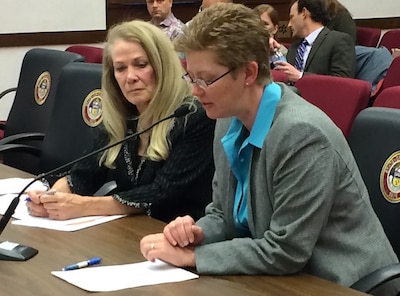A bill that would ban mandatory state language arts and math tests in ninth grade cleared the Senate Education Committee Thursday. But the panel added seemingly extraneous amendments that are likely to reduce the bill’s already slim chances of passing the full legislature.
The original version of the bill merely would have banned ninth grade testing and was sponsored by conservative Republican Sen. Vicki Marble of Fort Collins, along with liberal Democratic Sen. Mike Merrifield of Colorado Springs and two committee Republicans. All the sponsors were dissatisfied with last session’s compromise testing law, which retained ninth grade exams.
Amendments proposed Thursday significantly changed the complexion of the bill and made it much more partisan:
- Districts could choose to give the tests if they wanted.
- Rural districts that chose not to give the ninth grade tests would be allowed to hire non-licensed teachers.
- Teacher tenure rules would change for any district that chose not to give the tests. In those districts probationary teachers would remain on probation permanently. Non-probationary teachers who lost that status because of evaluations also would remain on probation permanently. Those changes wouldn’t apply to districts that continue to give ninth grade tests.

The last two changes were the brainchild of committee chair Sen. Owen Hill, R-Colorado Springs, who sprung them on the committee – or at least its Democratic members – without notice.
The amendments caused confusion among committee members.
“I’m baffled by the amendment,” said Sen. Nancy Todd, D-Aurora.
“I see absolute no connection,” said Sen. Andy Kerr, D-Lakewood. “This completely changes the direction of the bill.”
Hill offered no detailed rationale for the changes, either during discussion or during a brief hallway interview after the hearing.
Some observers speculated later that the amendments were a dig at the Colorado Education Association, which had supported the bill but differs with Hill on other issues. CEA is the state’s largest teachers union.
Earlier in the hearing CEA President Kerrie Dallman spoke in glowing support of the bill and voiced harsh criticism of standardized testing. CEA will oppose the amended version.
Testimony highlighted the interesting crosscurrents on the issue, with some teachers supporting the bill while other opposed it. Representatives from several education reform groups, both liberal and conservative, opposed the ban on ninth grade exams.
The bill cleared the committee along party lines, 5-4.
The bill was considered a long shot even in its original form. Even if it passed both the House and Senate, Democratic Gov. John Hickenlooper supports ninth grade testing and would be likely to veto any such measure.
Tuition tax credits bill also passes on party-line vote
Earlier in the hearing, the committee voted 5-4 in favor of this year’s proposal to offer parents state tax credits for the cost of private school tuition. Parents who home school their children also could claim credits, and the credits would be transferrable among families.
The bill is a pet cause of Sen. Kevin Lundberg, R-Berthoud. While such tax credits have been implemented in some other states, the idea never has gained traction in the Colorado legislature.
Versions of the idea were killed in the House in 2013 and 2014, years when Democrats controlled both houses. Republicans gained Senate control in the 2014 elections, and a tax credits bill passed that chamber 18-17 last year. It died in a House committee.

